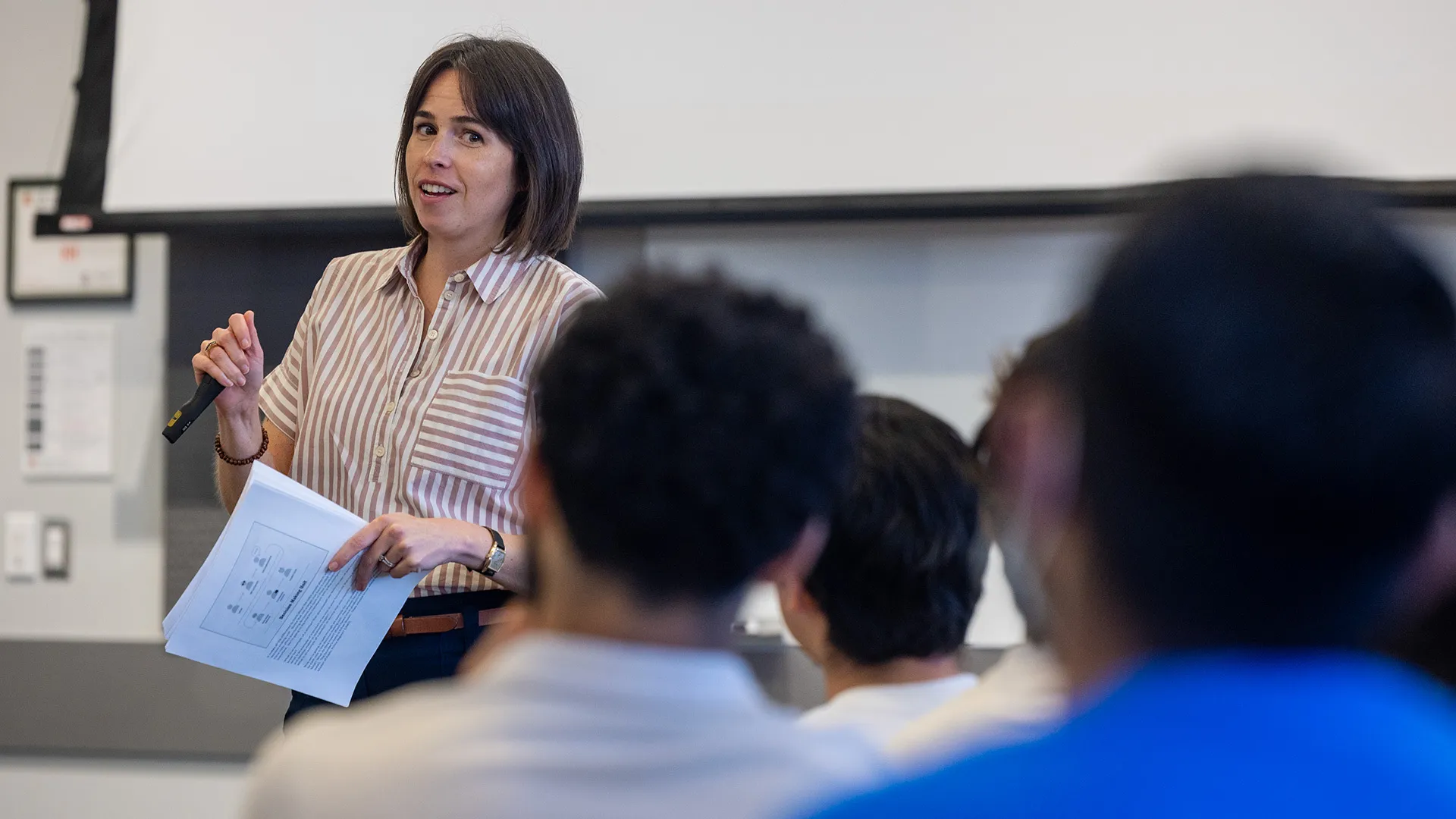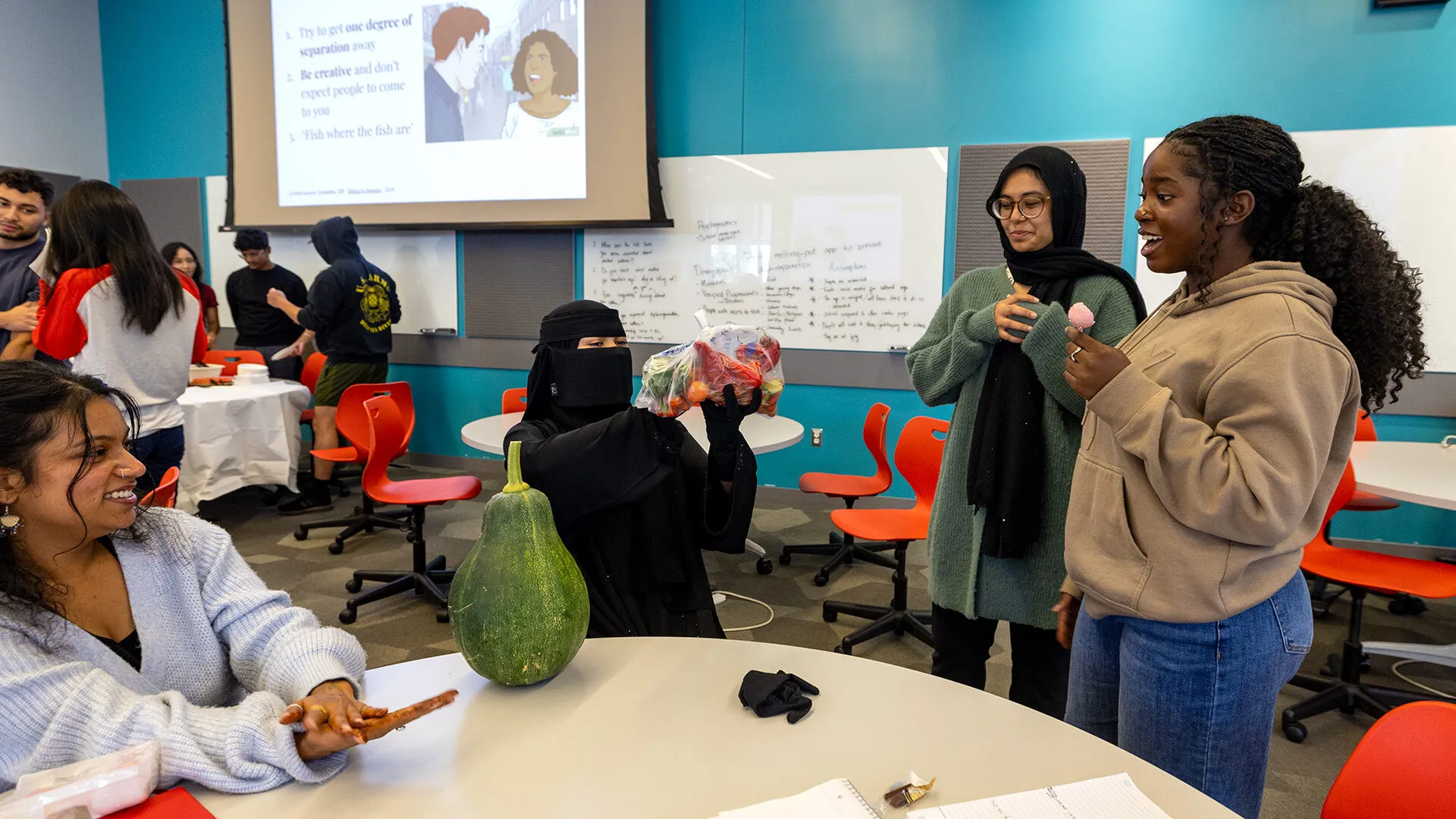- October 21, 2025
- By Karen Shih ’09
You’d never mistake Sara Herald’s class for a comedy show or a beat-thumping concert. But her Friday classes have a surprising thing in common: Yondr pouches.
The lockable fabric bags used to store smartphones have become a natural part of her “Strategies for Innovation and Entrepreneurship” course at the University of Maryland, where students go device-free for more than two hours.
“It’s a really simple solution that has some really positive effects,” said Herald, director of UMD’s Southern Management Leadership Program (SMLP), who also requires laptops, tablets and smartwatches to be put away. As she lectures, all eyes are on her, and when she asks questions, a sea of hands pops up. When she sends students to whiteboards to brainstorm startup plans and risks, a hushed chatter spreads across the room as students bounce ideas off each other, rather than pull out their phones to consult ChatGPT.
“I view laptops and technology as tools, but we’ve gotten too far from their utility and become overwhelmed by the negative effects,” she said. That includes mental health struggles, inability to focus and diminished socio-emotional development—all issues that have led to growing bans in K-12 schools across the country. “It’s not the students’ fault they are addicted to the devices and apps, because they’re designed that way. We want to support them in staying focused.”

Sara Herald lectures about business strategies to engaged students.
Herald previously discouraged electronics in her classes without an outright prohibition, starting from her time at the Robert H. Smith School of Business to her more recent role at SMLP, a two-year program for students who transfer from Montgomery College and Prince George’s Community College. Laptops are “an actual physical barrier,” and smartwatches became “mini buzzing distractions,” so she bought notebooks and pens for her students.
This school year, she found room in the SMLP budget to purchase 40 Yondr pouches, which make phones inaccessible to students, and started using them during the program’s summer orientation—even during breaks.
“They were totally shocked. They didn’t think I was serious,” Herald said. “You could see the anxiety in their eyes.”
Over the three days, however, students got used to the new normal. When they took a trip to the Eppley Recreation Center climbing wall, they cheered each other on and chatted while they waited their turn, rather than scroll through social media, said Kaylee Mendoza ’26, a public policy major in Herald’s class who worked with the incoming students.
She likes Herald’s approach, because she gets distracted in other courses when she can see peers playing games on their laptops and can’t help but pick up her phone during breaks. On Fridays, however, after learning about how firms like Southwest and Beyond Meat innovate and disrupt markets, she frequently walks with a group over to the café across the building in the Ed St. John Learning and Teaching Center. Back in the SMLP classroom, fellow students play tic-tac-toe or hangman on the board—or even bring in home-grown tomatoes and a festively mottled fall squash to share.

From left, Tina Saha '26, Zainab Ali '26, Samiya Farhin '26 and Ashley Ettah '26 chat during a class break about veggies brought in by Farhin to share.
Making those connections is especially important in a program where most students are commuters, said accounting and marketing double major Isai Castillo ’26, who says he’s gained more friends this year.
“It makes class more enjoyable. It builds a better atmosphere to learn in because everyone knows what’s going on,” he said. And he’s even extended it: “If I need to get some focus work done at home, I get rid of my phone—out of sight, out of mind.”
That’s encouraging to Herald, who plans to continue the no-tech policy in future classes. When she shared her experience in an undergraduate studies meeting this fall, several people wanted to know how it went (“Were students revolting?”) and how they could replicate it.
It helps, she said, to start the semester by explaining how research shows taking notes by hand requires your brain to synthesize information more effectively, because you can’t write as fast as people talk; typing can just turn into transcribing. She also provides her slides to students so they don’t feel the need to frantically write every single thing down.
Those with documented accommodations can always use approved devices to support their learning or special personal circumstances (for example, one student is the emergency contact for her younger brother and keeps her smartwatch on “do not disturb” to minimize non-emergency disruptions).
“I work really hard to design my classes to be thought-provoking, engaging and fast-paced,” she said. “For the most part, the feedback is positive. I’m hoping more people take the plunge.”
Topics
Campus & CommunityTags
Student Experience